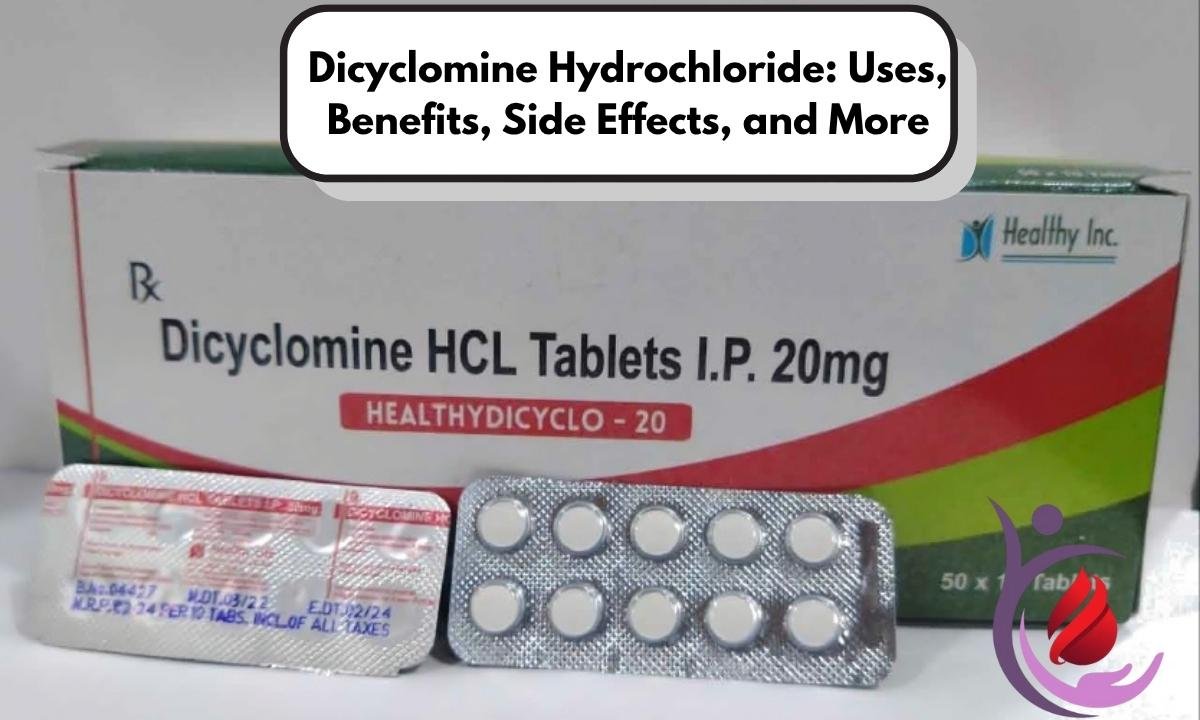Dicyclomine Hydrochloride: Uses, Benefits, Side Effects, and More
Dicyclomine Hydrochloride is a commonly prescribed medication used for the treatment of various gastrointestinal disorders. Known for its antispasmodic properties, it has been a key component in managing irritable bowel syndrome (IBS) and other related conditions. This comprehensive blog will help you understand what dicyclomine is, how it works, its medical uses, dosage guidelines, possible side effects, and precautions to keep in mind.
What is Dicyclomine Hydrochloride?
Dicyclomine Hydrochloride is an anticholinergic and antispasmodic medication. It works primarily by relaxing the smooth muscles of the gastrointestinal tract, thereby reducing muscle spasms and cramping. Dicyclomine is often sold under brand names such as Bentyl, Dicyclomine Hydrochloride, and others. It is available in various forms including tablets, capsules, and injectable solutions.

How Does Dicyclomine Work
Dicyclomine works by blocking the action of a neurotransmitter called acetylcholine on the smooth muscle of the gut. Acetylcholine is responsible for stimulating muscle contractions. By inhibiting its effect, dicyclomine reduces involuntary muscle movements and spasms in the digestive tract. This makes it especially effective in relieving abdominal pain and bloating associated with IBS.
Medical Uses of Dicyclomine Hydrochloride
1. Irritable Bowel Syndrome (IBS)
The most common indication for dicyclomine is IBS. This condition is characterized by abdominal pain, cramping, bloating, gas, and altered bowel habits (diarrhea, constipation, or both). Dicyclomine helps ease these symptoms by calming the muscles in the intestines.
2. Functional Bowel Disorders
Beyond IBS, dicyclomine is sometimes prescribed for other functional bowel disorders that involve muscle spasms or irregular intestinal movement.
3. Spastic Colon and Colitis
In cases where the colon exhibits hyperactivity leading to spasms, such as in spastic colon and certain forms of colitis, dicyclomine can provide relief.
Dosage and Administratio
The dosage of dicyclomine depends on several factors including age, weight, and the severity of symptoms.
For Adults:
- The typical starting dose is 20 mg taken four times a day.
- Based on tolerance and effectiveness, the dose may be increased to 40 mg four times a day after the first week.
- The maximum recommended dose is 160 mg per day.
For Children:
- Dicyclomine is not generally recommended for infants or children under six months of age.
- In older children, dosing is determined based on body weight and medical supervision is necessary.
Forms Available:
- Oral Tablets (10 mg or 20 mg)
- Oral Syrup
- Injectable Form
It is usually taken 30 minutes to one hour before meals, and preferably not with food unless prescribed otherwise.
Common Side Effect
While dicyclomine is generally well-tolerated, some patients may experience side effects. These include:
Common Side Effects:
- Dry mouth
- Dizziness or light-headedness
- Blurred vision
- Nausea
- Drowsiness
- Constipation
- Loss of taste
Serious Side Effects (Less Common):
- Difficulty urinating
- Fast or irregular heartbeat
- Confusion or hallucinations
- Trouble breathing
- Allergic reactions such as rash, itching, or swelling
If any severe side effects occur, seek medical help immediately.
Contraindications and Precautions
Dicyclomine should be used with caution and is contraindicated in certain medical conditions. Always inform your doctor about your complete medical history before starting the medication.
Contraindications Include:
- Infants under 6 months old
- Patients with obstructive uropathy (urinary tract obstruction)
- Glaucoma
- Severe ulcerative colitis
- Myasthenia gravis
- Reflux esophagitis
- Allergies to dicyclomine or other anticholinergic agents
Use with Caution in:
- Elderly patients
- Individuals with heart disease
- People with kidney or liver disorders
- Pregnant or breastfeeding women (use only if clearly needed)
Drug Interactions
Dicyclomine can interact with other medications, potentially affecting how they work or increasing the risk of side effects.
Common Interactions:
- Antihistamines (e.g., diphenhydramine)
- Tricyclic antidepressants
- Antipsychotics
- Narcotic pain relievers
- Other anticholinergic drugs
Always provide your doctor or pharmacist with a complete list of medications, supplements, or herbal products you are taking.
Tips for Safe Use
- Stay hydrated, as dicyclomine may reduce sweating and increase the risk of heatstroke.
- Avoid driving or operating machinery if you experience dizziness or drowsiness.
- Do not drink alcohol while on this medication, as it can enhance side effects.
- Store in a cool, dry place, away from light and moisture.
When to Contact a Doctor
You should seek medical attention if:
- Your symptoms do not improve after a few weeks of use.
- You experience severe side effects or allergic reactions.
- You notice unusual changes in vision, behavior, or urination.
Alternatives to Dicyclomin
If dicyclomine is not effective or suitable for you, your doctor might recommend alternative treatments such as:
- Hyoscyamine
- Peppermint oil capsules
- Antidepressants for IBS
- Dietary changes (e.g., low-FODMAP diet)
- Probiotics
Conclusion
Dicyclomine Hydrochloride is a trusted medication for managing gastrointestinal spasms, especially in conditions like irritable bowel syndrome. While it offers significant relief from cramping, bloating, and abdominal pain, it should be used under the guidance of a healthcare professional. Understanding the proper dosage, potential side effects, and interactions is key to making the most out of your treatment. Always consult your doctor before starting or stopping any medication.
Also Read About –

